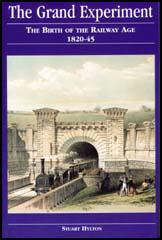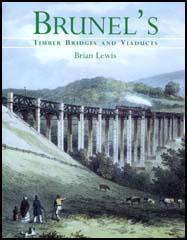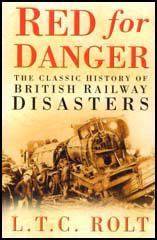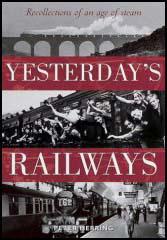Spartacus Review
Volume 5: 4th November, 2007
The Railways

Title: The Grand Experiment
Author: Stuart Hylton
Editor:
Publisher: Ian Allan Publishing
Price: £19.99
Bookshop: Amazon
Spartacus Website: British Railways
Category:
Between 1800 and 1850 Britain underwent a revolution, not in the political sense, but a social and economic one. The Industrial Revolution when, for a few short decades, Britain became the 'Workshop of the World' was one of the defining eras of modern history. The country's economy moved from one based upon agriculture to one where trade and industry dominated. Many factors played their part in bringing about this radical change in the national condition but one of the most significant was the revolution in transport without which the other elements which made up by the Industrial Revolution would not have been possible or would have occurred much more slowly. It was the coming of the railway that, for the first time, truly knitted the country together, bringing as it did uniform time across the country for the first time in history. Detailed in its analysis and comprehensive in its coverage "The Grand Experiment: The Birth of the Railway Age 1820-1845" will become the definitive account of this vital period in Britain's transport and economic history. It will be required reading for all historians of the period as well as the growing number fascinated with the history of the Industrial Revolution.

Title: Brunel's Timber Bridges and Viaducts
Author: Brian Lewis
Editor:
Publisher: Ian Allan Publishing
Price: £24.99
Bookshop: Amazon
Spartacus Website: British Railways
Category:
Drawing upon the records of the GWR held by such bodies as the National Archives and the National Railway Museum and in various county record offices, the book shows how prevalent the use of wooden bridges and viaducts was across the entire Great Western Railway and its satellite companies. Traditionally associated with Cornwall, wooden structures designed by Brunel could be found almost anywhere on the broad gauge, from the Home Counties through to the Cotswolds. Illustrated throughout, with both contemporary engineering drawings and photographs of the structures in use this title represents a detailed study into this important and often overlooked facet of Brunel's work.

Title: Red for Danger
Author: L. T. C. Rolt
Editor:
Publisher: Sutton
Price: £14.99
Bookshop: Amazon
Spartacus Website: British Railways
Category:
Railway disasters are almost always the result of human fallibility - a single mistake by an engine-driver, guard or signalman, or some lack of communication between them - and it is in the short distance between the trivial error and its terrible consequence that the drama of the railway accident lies. First published in 1955, and the result of Rolt's careful investigation and study of the verbatim reports and findings by HM Inspectorate of Railways, this book was the first work to record the history of railway disasters, and it remains the classic account. It covers every major accident on British railways between 1840 and 1957 which resulted in a change in railway working practice, and reveals the evolution of safety devices and methods which came to make the British railway carriage one of the safest modes of transport in the world. This edition uses the last text produced by Rolt himself in 1966 and includes a new introduction by his friend and fellow railway historian Professor Jack Simmons.

Title: Yesterday's Railways
Author: Peter Herring
Editor:
Publisher: David & Charles
Price: £14.99
Bookshop: Amazon
Spartacus Website: British Railways
Category:
Many still recall when the train was their principal means of travel, whether to school or work, to visit friends and relatives, or to go on holiday. And it wasn't just people that went by rail: so did the coal that heated homes, the food that filled them and the bricks that built them. They also served the great ports, conveying everything from thousand-ton loads of iron to baskets of racing pigeons. It was a time when a train journey remained an adventure, and when the steam locomotives that made that journey possible were a source of awe and fascination. This era is recalled in Yesterday's Railways, which includes a comprehensive history of Britain's railways from the ground-breaking years of the 1900s to the day in August 1968 that the fires were put out for the last time.
